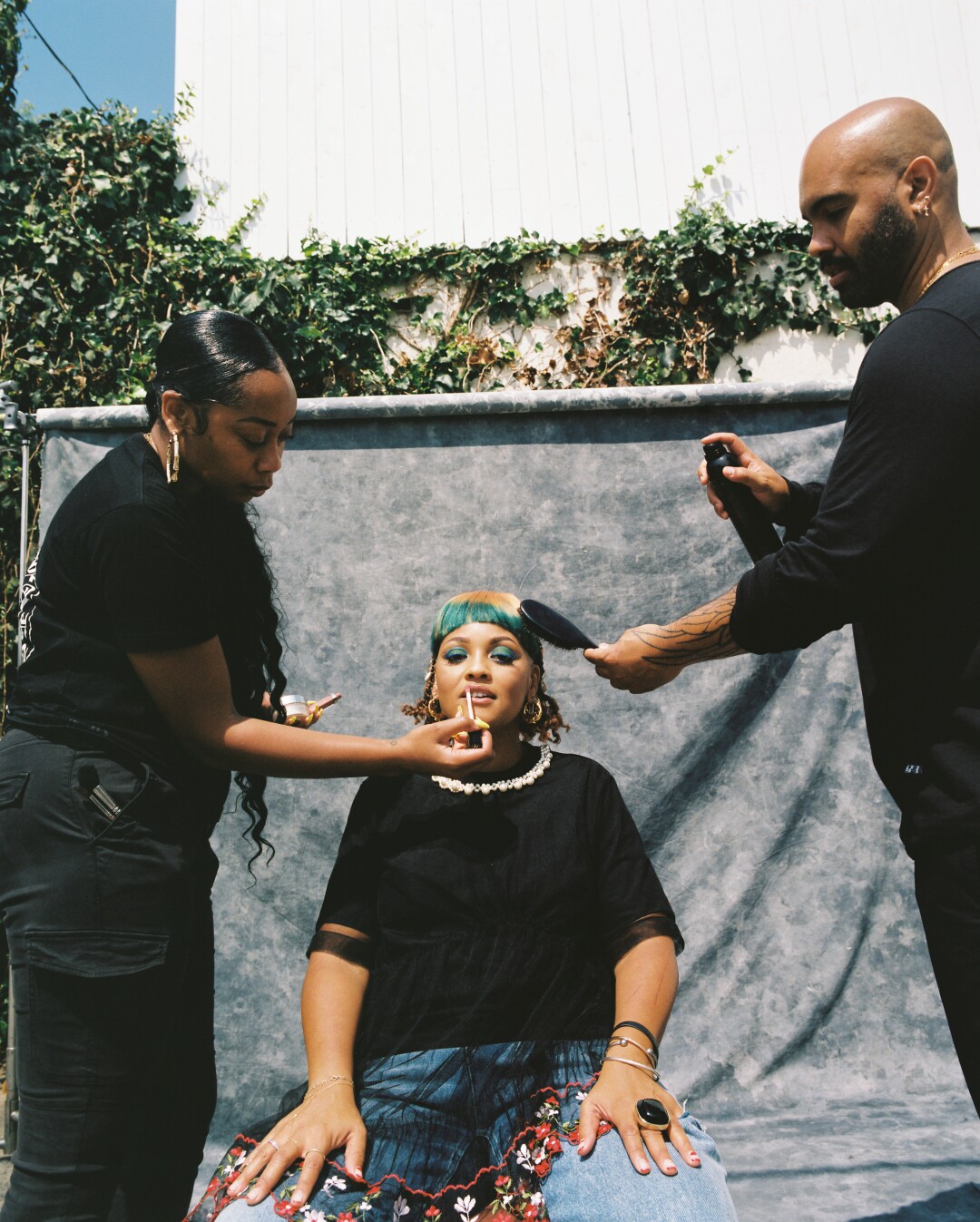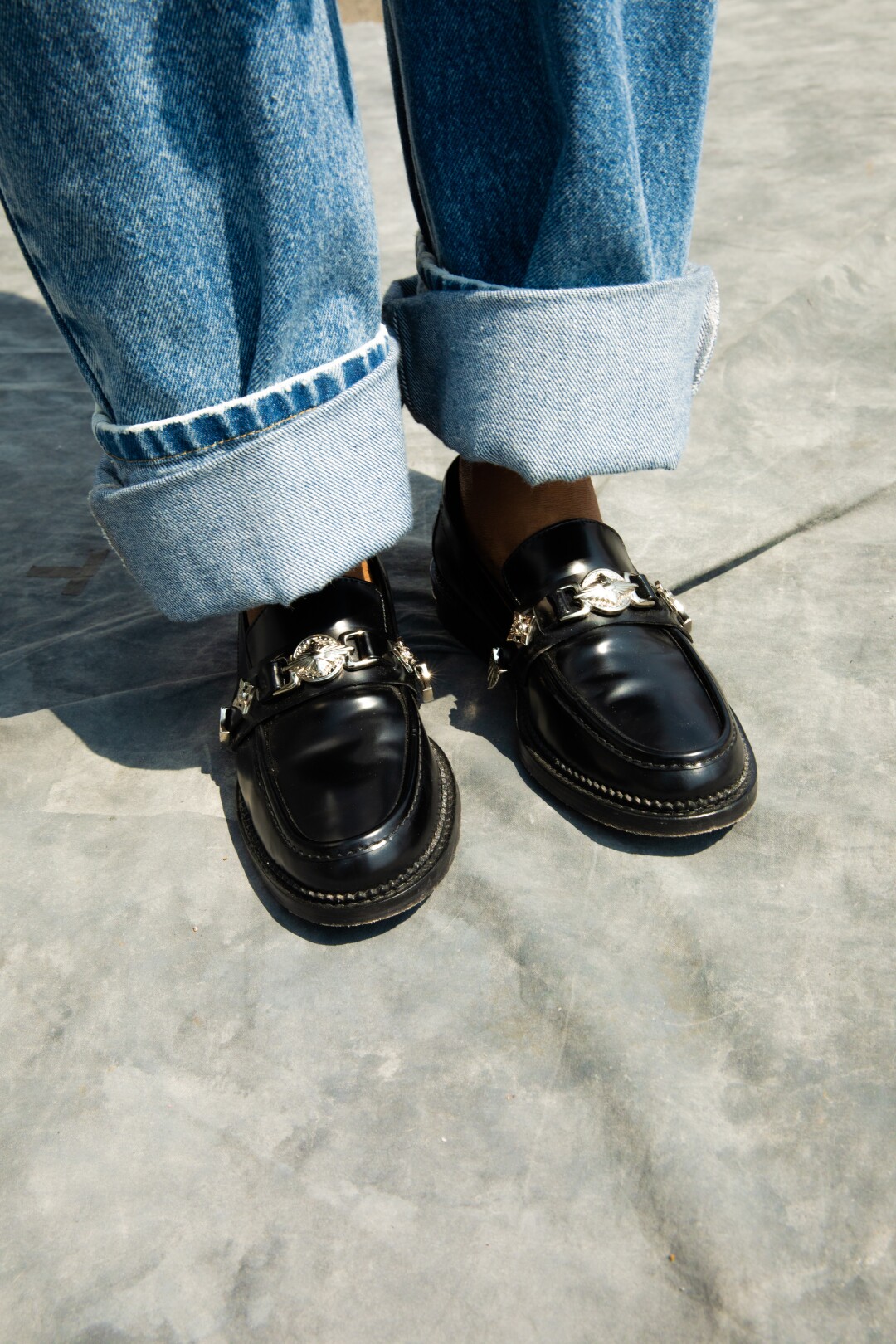This is part of Image Issue 4, “Image Makers,” a paean to L.A.’s luminaries of style. In this issue, we pay tribute to the people and brands pushing fashion culture in the city forward.
As much as streetwear is rooted in rebellion and individuality, there’s always a hum of togetherness too. One of the foremost, yet often forgotten, motivations behind streetwear is the importance of banding together around a common message and mindset. Streetwear is about talking back to the community you’re a part of and responding to the conversations around you. That can be lost in the midst of the drops and spikes in the resale market.
Beth Birkett has never forgotten this. A self-described New York transplant living in L.A., she is the founder of Bephies Beauty Supply, part streetwear brand, part collective of women of color redefining beauty and fashion as “vivid, powerful and individual.” “I didn’t really want to make clothing so much. But I did want to make a statement,” she says. “And I did want to create a community and help other people who are really good at making clothes.”
Beth Birkett wears Miles Jefferies Hair Bangers; Marni Gold Embellished Hoop Earrings, $350
(Nailah Howze/For The Times)
Beth’s vision can be found around L.A. She is the co-owner and creative director of the streetwear staple Union with her husband, Chris Gibbs. (GQ once dubbed them the “First Family of Streetwear.”) She is a costume designer and a co-host of HBO Max’s reality competition show “The Hype,” which examines the streetwear scene, culture and the business of fashion and films in L.A. When Beth judges the aspiring designers and entrepreneurs, along with Migos’ Offset and stylist Marni Senofonte, she has an assured presence; she’s someone who has been in the game for a minute. “I always wanted to be the one that was taking kids, putting them on and helping them,” she says. “But there’s challenges when you’re a Black woman and no one thinks that you can actually do that.”
Bephies Beauty Supply is Beth’s response to what she wants to see more of: “I’m so adamant about creating my own table and bringing other really dope, talented people with me.”

Makeup by Deena; Hair banger by Miles Jefferies; Braids by @thatchick703
(Nailah Howze/For The Times)
Darian Symoné Harvin: What does that look like?
Beth Birkett: It’s a very inclusive place. And that’s always been my dream, because I’ve had the opportunity to be included in a lot of things that most people like myself have not been privy to. That’s why I created Bephies Beauty Supply — to be able to do that for other Black women and women of color. It’s not exclusive to that. But it’s something that’s important that I want to highlight. I’m not trying to speak to all Black women, I’m not trying to speak to all women of color. But I want to show different types of women — and that’s when the beauty supplies part is really important to me, because I’ve never fit into any box in terms of beauty and style. I understand what it’s like to not feel like you fit into a box. But I’ve always created my own boxes.
DSH: I’ve found that people get uncomfortable when they can’t pinpoint you. And then they project that. But everything you just said feels like the real motivation behind Bephies Beauty Supply.
BB: Truly. The whole motivation behind all of it. It’s literally like, “Why don’t we just want to be who we are?” Right? And I understand that the media and society has been like: “This is beauty. This is brains. This is power. This is success.” But if you have your own definition of what that is, that’s OK too.
::
Beth moved around a lot as a child. Born in the Bronx, she grew up among Palmdale and Lancaster in Southern California and New York (her father was in the military). She remembers frequenting the Slauson swap meet. Bephies Beauty Supply is her way of being “the person I don’t see out there.” She didn’t know she wanted to be in the arts or fashion. “My parents weren’t artists,” she says. “So it was kind of something I just figured out.”
Bephies launched in March 2020. The name comes from a nickname; endearment is quite literally baked into the DNA of the brand. Early on, the aesthetic was more about capturing dynamism through tone: Long-sleeve shirts were more substantial, thick; scrunchie tops were elevated versions of the nostalgic trend; short-sleeve tees were dyed marble and featured bold statements subtly stitched into the fabric. Fast-forward through a whole panini and Bephies’ profile is everywhere. (And not just on the promotional posters on fences off Melrose and the billboards towering above Sunset.) The brand has collaborated with Henry Mask and Wray & Nephew Rum (a nod to her and Chris’ West Indian heritage) and has worked with such retailers as Nordstrom.
The Bephies’ e-commerce site has the vibe of Claire’s but all grown up. Pretty much what Beth was going for. There are colorful wooden hair ballies, purple leather goods handcrafted by artist Agnes Baddoo, press-on nails in collaboration with nail artist Astrid Curet and kaftans, robes, pillows, mirrors and silk pajamas, all printed with the Bephies’ logo, which features the profile of a Black girl with Bantu knots and bamboo earrings. There’s also a blog, Notes From the Salon, a curated story series on “women and beauty, through the lens of our multi-cultural community, systems and self.”

Toga Pulla Black Leather Hardware Loafers, $535
(Nailah Howze/For The Times)
For Beth, meeting people where they’re at is why Bephies has resonated with so many, so quickly. “I’m hoping that they are able to see themselves,” she says. “It’s seeing someone that you might not necessarily know or understand, but you get that she’s not completely accepted. I think a lot of people gravitate towards being a part of the underdog crew.”
Darian Symoné Harvin is a beauty and culture writer. She was born in Long Beach, Calif., grew up in Buffalo, N.Y., and lives in Los Angeles.
More stories from Image
https://www.latimes.com/lifestyle/image/story/2021-09-16/bephies-beauty-supply-is-redefining-what-community-in-l-a-streetwear-looks-like
 fashion rec fashion wanted
fashion rec fashion wanted
